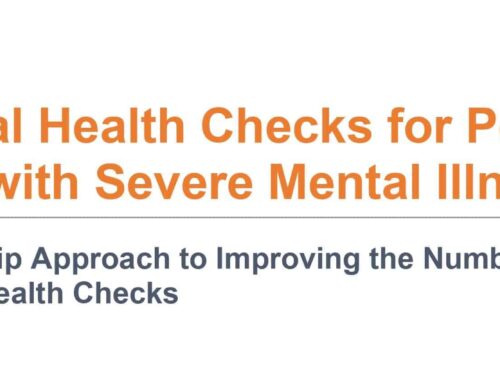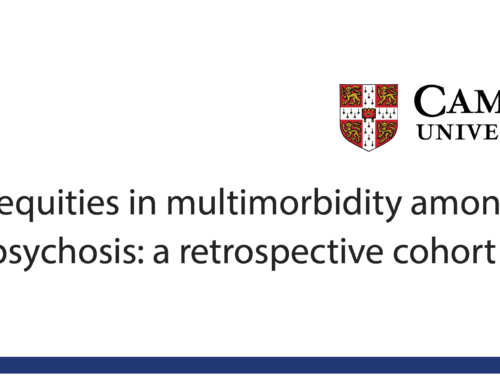Project Description
1. Background
In England, there were 534,431 people on the 2016 to 2017 mental health register of the Quality and Outcome Framework in General Practice.
Most of these people have a severe mental illness (SMI) such as schizophrenia, bipolar disorder and psychosis.
About 7,000 people in England are long-term residents or inpatients of mental health providers.
On average, people with SMI will die 15 to 20 years earlier from poor physical health, compared with the rest of the population.
Rates of liver, respiratory, cardiovascular disease and cancer are significantly higher. People with SMI develop these diseases at an earlier age than the general population even when adjustments are made for age, sex and deprivation.
The prevalence of disease including diabetes and hypertension is also significantly higher in people with SMI even when the data is standardised for age, sex and deprivation.
Equally Well UK is an initiative that aims to help people with SMI have the same level of physical health as those without. Public Health England (PHE) is a member and a signatory to the Equally Well charter.
2. Access to screening
People living in the community with an SMI are less likely to take up the offer of screening and are specifically identified as needing additional support to access screening.
National screening service specifications include an equality statement that states services should “help reduce health inequalities…, tailoring and targeting interventions when necessary”.
In accordance with the PHE Screening inequalities strategy, providers and commissioners should aim to make sure people with SMI have equal access to screening as defined in the public sector equality duty (Equality Act 2010).
Access to national screening programmes largely depends on individuals being registered with a GP.
Many people who are long-term residents of mental health care providers are not registered with a GP. Go to British Medical Association (BMA) guidance on how this should be addressed.
Some secure mental health settings do not have an Organisation Data Service (ODS) code, which is the unique identifying code used by the NHS for various purposes, including supporting national IT systems.
Not having an ODS code can inhibit access to some programmes, such as bowel cancer screening. Pilot projects are under way in England to test best practice in these cases.
Under the terms of the Equality Act 2010 it is appropriate to identify as disabled anyone with a physical or mental impairment that has a “substantial” and “long-term” negative effect on their ability to do normal daily activities.
Some people with severe and enduring mental illness may not be captured by the current GP SMI register due to their diagnosis. This can include people with personality disorders and people with eating disorders.
Primary care and screening providers will need to take extra action to make sure people with SMI are identified and reasonable adjustments made to enable them to access screening.
3. Advice for commissioners
Commissioners should highlight to service providers their responsibility as defined in the service specifications to enable people with SMI to access screening.
The NHS Standard Contract for medium and low secure mental health services states: “All individuals will have access to primary healthcare services (including health promotion) as appropriate and in particular shall have access to… appropriate age and gender specific screening in line with the Department of Health guidance.”
Public health leadership and partnership working is essential to maximise opportunities to improve access to screening.
Commissioners should:
- use local programme boards to raise the profile of people with SMI and their screening needs
- identify and close any gaps in knowledge and awareness among mental health provider staff, screening service providers and respective contracts teams by sharing published evidence on the screening needs of people with SMI
- facilitate contact between mental health providers and screening providers to identify and invite eligible screening cohorts
- work in partnership to ensure mental health providers are aware of all the national screening programmes and their eligible cohorts
- support screening providers to develop and share appropriate information for mental healthcare providers so that they can have confident discussions about screening with their inpatients
When contracting for screening services, commissioners can use localised Commissioning for Quality and Innovation (CQUIN) targets to improve access to screening for mental health secure unit (MHSU) residents. For example, this can be as part of a broader CQUIN to address health inequalities as outlined in the equality section of the Section 7a screening programme service specifications.
See Appendix 1 for details of mental health care providers that commissioners can share with local screening services.
NHS England Specialised Commissioning holds the contracts for residential secure units and can also provide a list of units and type of unit in your area.
If a provider does not have an ODS code, contact should be made with the relevant PHEIT lead. Go to Further information section.
4. Advice for screening providers
Screening providers should see Appendix 1 for mental healthcare providers to identify and share local providers with screening services.
Screening providers should:
- identify and maintain a named contact, in each mental health provider, whose role includes responsibility for residential healthcare
- give appropriate screening information to mental healthcare providers so they can have confident discussions about screening with their inpatients
- work together with mental healthcare providers to identify the eligible cohort and screening status of inpatients
- establish a referral pathway and standard operating procedure(s) for seeking consent, timely invitations and subsequent recall where applicable
- learn, where appropriate, from local screening provision for prison populations
- use national leaflets to support informed choice, signposting to easy-read versions for antenatal and newborn, abdominal aortic aneurysm (AAA), bowel cancer, breast, cervical and diabetic eye screening as appropriate
Screening providers should work with mental healthcare staff to make sure:
- individuals can make an informed choice about screening
- reasonable adjustments are put in place so that screening is accessible
Where individuals lack capacity to make an informed decision about screening, mental healthcare staff should follow best interest procedures in accordance with the Mental Capacity Act 2005.
5. Further information
PHE report on SMI and physical health inequalities
Mental health data and analysis: a guide for health professionals
Mental health fingertips data profiles
PHE IT leads can be contacted via the PHE Screening helpdesk.
NHS population screening helpdesk
PHE Screening
Floor 5
Wellington House
133-155 Waterloo Road
London
SE1 8UG
EmailPHE.screeninghelpdesk@nhs.net
Helpdesk phone number020 3682 0890
The helpdesk is not for media enquiries and does not have access to screening results. For queries about results, contact your GP or local screening service. Order screening leaflets at www.gov.uk/phe/screening-leaflets.






